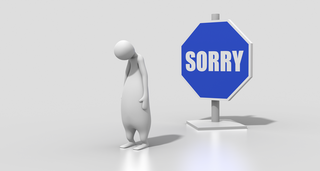Fear
Behind Chronic Indecisiveness: The Fear of Regret
Part 3: Fear of regret can stop you in your tracks.
Posted November 29, 2021 Reviewed by Ekua Hagan
Key points
- Fear of regret refers to anxiety about doing something one might later regret.
- The fear of regret intensifies the paralysis of chronic indecision.
- The fear of regret can keep someone from enjoying the path they have already taken.

The fear of regret is anxiety about doing something you might later regret. It is a direct consequence of having a rich imagination for all the scenarios that could go wrong, and a belief that—should there be a mistake or a negative consequence, should you be responsible for having made a wrong choice or done something too risky—your regrets would be unbearable.
The fear of regret intensifies the paralysis of chronic indecision.
You experience the fear of regret when you are unable to put your savings in a particular investment or buy something you can’t return. Or, if you can’t make a phone call because you imagine how you might feel if it becomes awkward and then you might regret having made the call.
You automatically imagine the awful consequences of everything going wrong and may well feel that you “could not stand it." You may imagine that you will never be able to “get over it” and will suffer endlessly. This can stop you in your tracks—especially if you believe you are not well equipped to handle regret.
With those kinds of stakes in mind, it is no wonder that moving forward becomes problematic.
When do we feel regret?
Regret is experienced when you look back at a choice point and say to yourself, “why didn’t I know?” or “how could I have done something like that?” or most commonly, “If only I had not done that." Regret can also come about when you have made a choice in the past that failed to fulfill some moral or practical obligation, or started a chain of events resulting in harm to yourself or others.
You can also feel regret when you have done something that has not caused any real trouble but has stimulated doubts, worries, or some other emotional distress because it seems in retrospect to have been “too risky," impulsive, or ill-considered. In the same vein, regret can happen if you did not take an action which you now wish you had.
Anticipation of regret can also happen if you are ambivalent about two possible choices. Ambivalence can occur when both choices seem either equally attractive or equally distressing, and choosing one means not choosing the other. In cases where neither choice seems good, “the grass might be greener if I choose the other” can be a paralyzing thought.
Even in low stakes situations—“the burger or the pasta?”, “wear this tie or that tie?”—if you believe that you might regret the loss of the choice left behind, you can be frozen in place, oscillating between choices. This can happen if you are anxious about being able to get past feelings in general, and it is common in people with sticky minds and anxiety sensitivity.
Regret plays some role in all our lives. We all make mistakes, and everyone can look at something they did in the past—regretting losing one’s temper, regretting an infidelity, or regretting a bad choice—and wish it had been different.
Additionally, there can be regret for what we didn’t do, such as turning down or not applying for a job, or not committing to a romantic partner. Because the costs of inaction are so often overlooked when paralyzed by chronic indecisiveness, regret almost always includes “I wish I had taken more chances” or “I regret not taking that opportunity."
Consequences of the fear of regret
Your imagination can torment you with “what ifs” about experiencing humiliation, losses, failures, or any other consequence that might give you unresolvable regrets. It can appear to be a dangerous slippery slope to do anything at all.
Fear of regret can be amplified if you, like most people, really did something in the past that was, in retrospect, a poor decision. Ruminating about a past mistake, error of judgment, or impulsive action that turned out badly is common in people with sticky minds and demanding standards.
Every decision we make reduces the alternatives that are available to us. If you rent an apartment, you are committed to that lease, to commuting from that area and sending your children to those schools.
With a rich imagination, even the most common, everyday decisions can become infused with the fear of regret: “Will I regret buying steel-cut oats instead of rolled?” or “will I regret spending time watching a comedy on TV rather than an educational documentary?”
Because you experience instant automatic doubts the moment you decide something—even if nothing has yet gone wrong—you approach decisions with trepidation. Since you want to avoid the “what if?” and “if only” worries, you avoid the decision itself. This is the reason that commitment without wavering is such an important component of decision-making. It is a way of walking past the doubts that always arise once a decision is reached.
The fear of regret is a component of FOMO (fear of missing out). Reluctance to close any pathways, opportunities, or options is fueled by the anticipation of wishing retrospectively that you had not limited yourself by making a choice.
The fear of regret can prevent you from moving forward. But it can also be an obstacle to enjoying the path you have already taken. As soon as a choice is made, doubts arise, and you feel uncertain about the future possible bad outcomes or consequences. The satisfaction of a choice well made, or a job well done becomes elusive because you are worried that a decision made in the past will lead you to regret it sometime in the future.
In the three parts of Behind Chronic Indecisiveness, we have explored why some people have an enduring pattern of avoiding decisions, despite the fact that there are obvious life-costs to doing so. The willingness to experience imperfection, make decisions despite doubts, and risk the possibility of regret may need to be addressed directly to break this habit.




